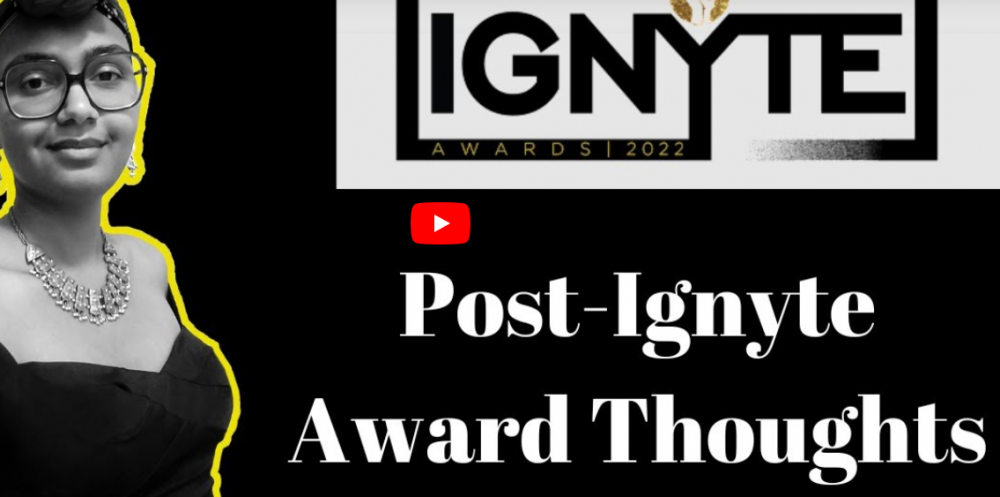Search the Community
Showing results for 'peele' in status updates posted by richardmurray.
Found 11 results
-
Writeup as I listened
12:10
Secrets to writing great horror12:12
He wrote the Kundalini equation < https://www.kobo.com/us/en/audiobook/the-kundalini-equation-1 >originally wrote to have a best seller and increase his career. A white guy was put on a peers cover. The firms back in the day to the original publication was not willing to look at their own responsibility.
True, the white audience in modernity is used to17:36
STeven sees the potential to do something unique to him. He will rewrite a former novel and turn it into something it should had been, and he will collaborate with Tananarive in the script form. He wants to use Tananarive practical historical smoothing.18:46
People suggest Tananarive Due is one of the greatest horror writers alive.20:10
what makes a great horror story?22:06
What is the greatest extent, what is the most extreme moment?
There is a point where it is too much or that is not enough. A symphony of different emotions to feel the experience. Using vision boards matters. You can feel your way before you write it.23:50
Now that a cardboard treatment, and now a written treatment and ask what is the experience of this movie be.
What is the difference between action or horror movies?
In action movies, people are getting hurt in a sequence, like in horror.
For Tananarive, the difference is the depth of characters.
For example, a horror movie about a bunch of college students on a ski trip. She can relate to college students through friends who like skiing.
Then a mercenary on a mission is on a ski lift. She can't relate to a mercenary or being on a ski lift.26:31
Horror needs a relatable character who is experiencing fear, a haunted house is not enough. You need a customer who has never been in that haunted house and something goes wrong. A couple for example trying to work out their stuff and it makes the external side internal.27:41
Tananarive has a template.
If she has to write a horror story and has three weeks.
->What scares you?
She uses survivor horror as that is scary to her and she has been camping, rafting.
->How do you make the story yours?
So more than bears, it becomes about a cult. Stephen King was a teacher growing up
->Believe in the characters
Suffered a trauma, and committed a transgression is common among writers of horror. Grief is common , the one horror no one overcomes.31:29
All horror is about surviving what you are in.
Imagine Get Out if Chris wasn't in grief over the lost of his mother.
Steven makes a point, deer antlers were used as a symbol to defend himself, which is like the deer he hit in the beginning of the film.32:37
Tananarive, she weaponized his Grief, and by the end, he has weaponized his own grief. To make it his strength and overcome.34:09
Tananative You can make "Get Out" a drama. Is Chris in love with the secret psycho white woman?
Peele discussed Guess who is coming to dinner in the early screenplay version of "Get Out"
< https://www.youtube.com/watch?v=wpGmCLcqgAw >
< https://www.shadowandact.com/what-is-black-horror-the-sunken-place-professor-tananarive-due-explains >36:27
Peele started with social anxiety. It wasn't about phenotypical frictions, merely the frictions of the stranger among a group of friends and amplify it.
Turn it up to 11.
Tananarive isn't into human horror. She is triggered by Human horror and make it a journey. It is a journey of self revelation.37:39
Liam Neeson, eyes in the grey.
She loves that film, for not about the wolf winning but standing up. Even though many call the end a downer. The film is about who the character becomes.38:44
Tananarive considers gaslighting her least favorite horror. PArents or spouses gaslighting children or spouses in her opinion is poor storytelling. Is it going to kill your character to cut on a flashlight in the dark room? She feels it is overdone. She calls it an artificial conceit. She loves Miles in the good house. Miles doesn't believe but stands by the female character.
< https://www.kobo.com/us/en/ebook/the-good-house-2 >40:47
You want psychological realism, nothing breaks more than when people act away from common responses. If you do not pick up a weapon going to a dark place you are an idiot.41:36
STeven Barnes, asks is that why meetings are the best part in horror to Tananarive.
Tananarive loves the meeting in horror.42:40
Steven talks of Texas Chainsaw Massacre, people of normal intelligence with no idea what is about to happen. In alien, normal people of normal intelligence. Whereas in prometheus, they were scientist and should had known better.43:57
Steven, Difference between action in horror, something killing you in the dark is horror, in the light as a tiger is action.
Horror is unknown, playing on the minds ways to whatever the truth is in the darkness. Action is more strategic, allows for knowable assessment.
45:20
Tananarive, the feeling of fear is different in action.
Steven, it will be interesting to take a liam neeson skill set taken man into a situation where he finds himself in a situation beyond his comprehension that he realizes.46:42
Tananarive, war time horror is like that. ala Predator.47:25
Steven, talks of Prey, the predator underestimates the human female lead.48:25
Elegance usually takes years. Steven says, the best pieces of horror were not primordial, they evolved.49:33
Tananarive, Think about the antagonists too. Make sure their is logic to Zombies. What is different in the way you write zombies?
< https://www.kobo.com/us/en/ebook/devil-s-wake >
Put your own unique spin. For example, the reason for haunting of ghost matters.
The interaction between characters side antagonist matters.
Steven, your god of the universe in your story
Alot of readers like the antagonist more than anybody else in the story, make it pop ,and don't repeat things.52:55
September 23rd 5-8 on the east coast ,
3 hour workshop. It is 197 dollars. If you can't afford it. You can email us and ask for a lower price.
how to format screenplay, all the hacks.
www. hollywoodloophole.com
< https://store.payloadz.com/details/2686637-other-files-arts-and-crafts-10-secrets-of-hollywood-writers-live-zoom-workshop.html >
They want engaged people. -
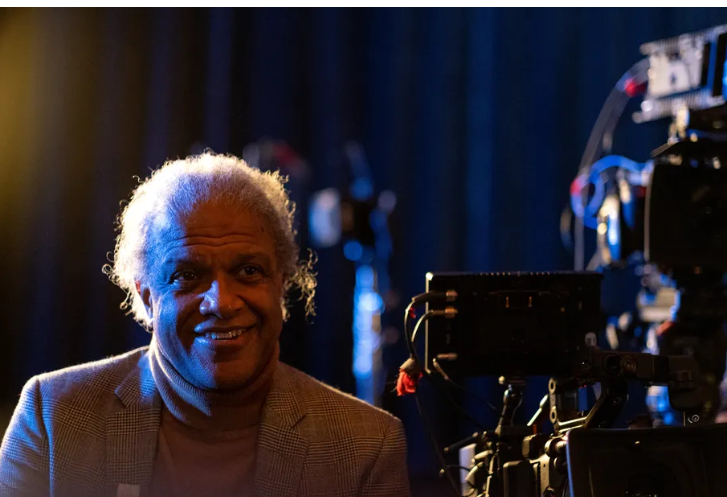
Elvis Mitchell on the set of Is That Black Enough For You?!? Hannah Kozak/Netflix
Hollywood’s Black film problem, explained by Elvis Mitchell
The venerated film critic on the unheralded Black influence on everything from soundtracks to Don’t Worry Darling.By Alissa Wilkinson@alissamariealissa@vox.com Nov 11, 2022, 7:30am EST
Over the past few years, movies like Black Panther and Get Out have raked in both accolades and box office returns, and the Oscar nominations hit new diversity records. To the casual observer, it may seem like Hollywood has made massive strides in moving from being overwhelmingly dominated by white actors, directors, and writers and toward a more inclusive environment. But from the standpoint of history, it’s startling how little has changed — and what that tells us about the industry.
That’s why Elvis Mitchell’s documentary Is That Black Enough For You?!?, which starts streaming on Netflix on November 11, is so revealing. The veteran critic and journalist, a former New York Times film critic, has, among many other pursuits, hosted KCRW’s phenomenal interview show The Treatment since 1996. He brings a wry and curious lens to the history of Black film in Hollywood, weaving interviews with renowned Black actors and filmmakers from Harry Belafonte to Zendaya into his own story. In so doing, he challenges many of the settled ideas about the film canon, Hollywood history, and what it’s meant to be a Black artist on screen.
I met Mitchell at a hotel on Manhattan’s Lower East Side to talk about those matters and a lot more. I wanted to ask him about Hollywood’s claims to inclusivity, about the still-common axiom that “Black films don’t travel,” and about why all of this history is really not so different from today. Our conversation has been edited and condensed for clarity.
Alissa Wilkinson side Elvis Mitchell interview BEGIN
Alissa Wilkinson
You say in the film that Hollywood appointed itself “the myth-maker” for the world. Early studio heads saw themselves as the guardians of America’s morality and morale, and the exporters of a message about America to the world.
But as you demonstrate, the story Hollywood told about Black people was often demeaning, and very far from the truth. What kind of an effect does that have on the myth that the country and the world internalize?
Elvis Mitchell
I think [Hollywood] was unique to film culture, different from any place else in the world. American movies were made by people who fled [their home countries] under enormous persecution, and then decided to create out of whole cloth this ideal of what America was — this America that they wanted to come to. And the America that they created is still being seen — it’s something popular culture is still responding to.
We noticed as we were putting the movie together that so many of the people on camera — Samuel L. Jackson, Suzanne de Passe, Charles Burnett, Laurence Fishburne — talked about Westerns. The myth became that there was never a Black person on a horse. That would have been empowerment; as soon as you put a Black person on a horse, you’re saying that they have some control over where they’re going, literally, within their lives. We can’t do that.
Back when Paul Thomas Anderson was talking about his film Boogie Nights, he talked about how absurd the idea of a Black cowboy is. So even Paul Thomas Anderson has been kind of rolled under by the idea the movies have created about what cowboys are supposed to be, rather than what they actually were.
So much of Black culture has been about responding to myths created about Black people through various forms of media. That response came from actors as much as filmmakers, because so many of these movies are not directed by Black people. Actors took some claim over [reclaiming the truth about being Black], and that confidence and that brio becomes this really transfixing quality.
Alissa Wilkinson
But it’s not just about telling America what it is, or what its own history is, but also exporting an idea of America and its history to people who aren’t American. My sense as a film critic is that we still see the reverberations of world perceptions of American Black culture through that influence.
Elvis Mitchell
That gets to this message that’s constantly pushed in Hollywood — that Black film won’t sell overseas.
Alissa Wilkinson
Exactly.
Elvis Mitchell
This shibboleth that exists to this very day, one that was constantly fed and cared for, that Black movies “don’t travel.” But think about [renowned Senegalese filmmaker] Ousmane Sembène in Africa, seeing what Ossie Davis is doing [in America], or seeing 1972’s Sounder, and being inspired by that, and creating his own ... I’m not going to say mythology, but his own worldview about Black masculinity. When that’s missing, what does that do to the culture?
It’s very convenient to say, “This stuff doesn’t travel.” Because it’s still this peculiar view of Black culture, even though it seeps in and subsumes everything. When you hear somebody on Fox say “24/7” — that’s hip-hop. They’re terrified by the “fist bump,” but they’ll say something is happening “24/7,” and thus they’re missing the entire point of their argument.
Alissa Wilkinson
Yes — here Ossie Davis is making films like Cotton Comes to Harlem and Black Girl, with roles in which Black characters can exercise self-determination, and it sparks something for filmmakers because their imaginations are expanded.
At the same time, though, you bring up that Sidney Poitier was, at one point, the number one box office draw, and yet Hollywood executives couldn’t imagine that any other Black actor could also be popular with a broader audience. The thinking is that it’s just Poitier; it’s an exception, it’s an anomaly, it’s just this one guy.
It reminded me of how people talk about huge, massive hits like Black Panther or Get Out today. There’s still a reluctance to greenlight big-budget Black films, because the thinking is, “Oh, well, that was a fluke.”
Elvis Mitchell
And what happens? We get a white remake of Get Out, called Don’t Worry Darling.
Alissa Wilkinson
You said it.
Elvis Mitchell
So at the same time, we have to be careful about the way we deal with Black film, because [Hollywood doesn’t think there are] “genres” in Black film; it’s just “Black film.” So when any Black film fails, it is a “Black film” that is failing, not that movie.
I remember when Black Panther came out, I talked to so many people, including Oprah, who said, “This is going to bring in a whole new way of [making] film.” No, it’s not. Because what happens when a film succeeds in a major way? It’s imitated. How many Jurassic World [imitations] have there been since the first Black Panther movie? And now, how many imitations of Black Panther have we seen? The answer is none, because they’re still treated as if lightning struck.
Alissa Wilkinson
Absolutely. Hollywood loves to make big creature movies, even if none of them hit quite like Jurassic Park. And this goes to something I think about a lot, which is that Hollywood is fundamentally conservative. Often people think of Hollywood as a very progressive, forward-looking industry, but it’s risk-averse and prone to sticking with whatever they know — which becomes a problem when what you know is stuck in some false idea of reality.
Do you think the reluctance to mainstream Black film in the industry is due to failure of imagination, built-in biases that they’d be horrified to be accused of, or what?
Elvis Mitchell
How much time do you have? Let’s send out for lunch.
To your point, Hollywood is a community that thinks of itself as being incredibly liberal, except when it comes to exercising that liberal impulse. Maybe they think their liberalism and commerce are two different things, but no, they’re not.
While we were trying to get [Is That Black Enough For You?!?] going, it got shut down by Covid; this was all happening at the same time that the country was reeling from the George Floyd attack, and the responses to that.
Back then, I would get these calls, saying, “So we want to put together this blue ribbon panel to figure out what we can do to make things [in Hollywood] different.” Look, we don’t need a panel. I don’t have time for this. I have three words for you: Hire Black people. It’s as simple as that. And not just one [Black person], but several, so the one person doesn’t have to labor under the burden of having to explain all of Black culture.
Alissa Wilkinson
Your film feels a little bit like a story about all the people who have been told that something “simply isn’t done” or “just can’t be done.” But when it is done, it’s a wild success — like Melvin van Peebles self-financing Sweet Sweetback’s Baadasssss Song because no studio would make it, and then it being a huge, era-defining hit. I sort of feel like that might apply to your own film — am I right? I can imagine people saying, “We can’t do this, nobody’s going to watch it, nobody’s going to be interested.”
Elvis Mitchell
People in effect said that when they turned down this same material in a book pitch. I thought, oh, this is the kind of thing that could go on a bookshelf next to Easy Riders, Raging Bulls, or Pictures at a Revolution. This isn’t esoterica. I’m not talking about a wave of art films.
In fact, these movies are not only enormous successes as movies, but they also created these soundtracks that were enormous successes, and then were imitated in ways that were enormous successes.
People who know and understand film history say, “Why hasn’t this documentary happened before?” I say, “I don’t know. If a tree falls in the forest, and there’s nobody to hear it, is that a legacy?” I mean, this is what this comes down to. I hate to torture a metaphor like that, but if it’s not reported on, then it’s not a legacy — if it’s not examined, if there’s not context offered.
Alissa Wilkinson
I think a problem is that people get very emotional and defensive when you threaten their canon, their idea of who did what first.
Why do you think this is?
Elvis Mitchell
There is this consistent boxing up of Black film culture. It’s this. It’s solely this. It is only this. It is Sidney Poitier. It is Black filmmakers finally getting a chance to work in the 1960s. It’s this thing that Melvin van Peebles has tried to fight his way, and then after that Spike Lee, and Robert Townsend, and so many filmmakers.
One of the reasons I wanted to present the idea of the dangers of canonical thought is that nobody tends to think about blackface in Alfred Hitchcock, in the 1937 film Young and Innocent. I remember seeing that as a kid, and thinking, “Oh my god, there’s blackface in an Alfred Hitchcock movie?” Or there is this idea in canonical thought that 1939 is the greatest movie era in American movie history. Some of us disagree with that.
Alissa Wilkinson
But it’s accepted as fact, along with the idea that a set of white filmmakers changed film in the early 1970s. There’s truth to it, but there’s more to the story.
Elvis Mitchell
They end up feeding into that river of myth. “These filmmakers came and changed everything” — well, they did sometimes, but they didn’t exist in a vacuum.
Alissa Wilkinson
Getting a chance to see these things on screen, in front of me, might be what’s good about doing this in film form instead of a book. I had honestly never really been struck by the similarities between depictions of Mickey Mouse and minstrelsy, but of course, it was obvious once you showed it to me in the film.
Elvis Mitchell
This feels like this innocent thing. In fact, it is not. Or, I’m not going to say it’s not innocent, but certainly there are layers to this that need to be pulled away, so we can see the entirety of it.
Mickey wasn’t keeping on gloves so he doesn’t leave any clues for a CSI team or something. “These are Mickey Mouse’s fingerprints, now we know who killed him.”
Alissa Wilkinson
Music is really important to this film, and it’s especially interesting to hear about how releasing a soundtrack before the movie’s release — pretty common now — was virtually unheard of before Super Fly.
Elvis Mitchell
By releasing the soundtrack [before the movie], and having it be such an immediate success, it created a must-see feeling around the movie. And it was constantly being played. If you drove around LA, you heard the commercial for the release of Super Fly. People respond to these songs, and then go out and buy the soundtrack. It is that rare case where you had people listen to the soundtrack before they saw the movie. So they created their own movie in their head through Curtis Mayfield’s soundtrack. And the movie, in some ways, couldn’t live up to that movie they created in their head.
Let’s be honest, those songs are better than the movie. There’s great stuff in the movie, but as a dramatic creation, as a narrative with its own life, that soundtrack is extraordinary. The soundtrack was a huge artistic and commercial success, and every song was released as a single. This isn’t like you’re making A Hard Day’s Night, and the Beatles are already a hit; this is something that becomes a mainstream hit that then propels the movie to enormous success. Shaft followed its example, and it started to happen so much that by the time Saturday Night Fever was coming out, they had the soundtrack out two months before the movie.
Then music videos also started coming out before the movie, and that became the coin of the realm for the ’80s, that the soundtrack was as important, if not more so, than the film. Super Fly did that.
Alissa Wilkinson
Now that’s all TikTok, 10-second clips. This summer the music from Baz Luhrmann’s Elvis started circulating on TikTok before the movie came out. I’m not even sure people knew what it was from, or that the “Hound Dog” remix was based on an Elvis song.
Every year I’ve been doing this job, and especially when Oscar season arrives, the industry starts touting how far they’ve come in terms of inclusivity — the whole #OscarsSoWhite issue having pushed it recently. That is, frankly, embarrassing, when you actually look at who gets jobs and who wins awards.
Elvis Mitchell
Here’s the example. Suzanne de Passe was nominated for Best Original Screenplay in 1973 [for co-writing Lady Sings the Blues]. How many other Black women have been nominated since that, in that category? None.
So when people would say to me, “Are you afraid this documentary’s going to seem dated?” No.
My fear is that it will never seem dated. In the film, Zendaya says, “It’d be great to see Black kids playing together on camera, or to see more Black people in a sci-fi fantasy.” Was that going to seem like old hat by the time this movie came out? No.
It’s weird to show this history to young people and have them go, “God, nothing has changed.” This is the thing that I wanted to try to find a way to deal with, too: Every decade we hear about this “resurgence in Black film.” But where did it go? It didn’t go anywhere; it just wasn’t being covered.
To your question, maybe in some fundamental way things have changed, but it’s still about trying to wrest some control of this narrative. Certainly, the visibility of the phenomenon may change, but Black women aren’t getting opportunities to write movies. It’s as simple as that.
It would be fun to say, “Well, god, in the three years since I’ve started working on this, so much has changed.” No.
Alissa Wilkinson side Elvis Mitchell interview END
Is That Black Enough For You?!? premieres on Netflix on November 11.
ARTICLE
https://www.vox.com/23447401/elvis-mitchell-black-enough-interview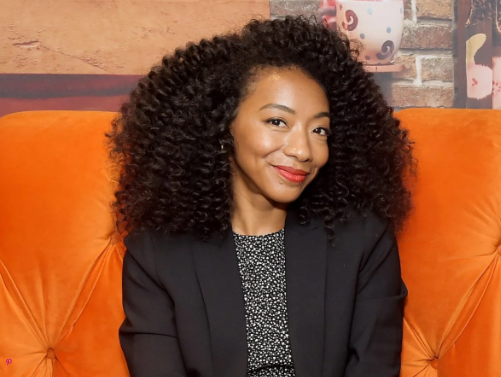
Unknown photographer
Betty Gabriel: The Unsung Black Scream Queen
"THERE IS A LOT OF HORROR WITHIN THE BLACK FEMALE EXPERIENCE IN THIS COUNTRY," THE ACTRESS SAID. "THERE IS A LOT TO BE MINED THERE."BY RIVEA RUFF · UPDATED OCTOBER 28, 2022
When the term “scream queen” is brought up annually around this time, images of white women narrowly escaping the clutches of a crazed killer or evil entity across film franchises or pivotal genre entries come to mind. Jamie Lee Curtis as Laurie Strode, locked in a 45-year-long battle against Michael Myers. Neve Campbell as Sidney Prescott, opposing the various murderers donning the famed Ghostface mask in the Scream franchise. Naomi Watts as the longsuffering mother fighting supernatural forces in The Ring and Shut-In, or scratching for survival in Funny Games or Goodnight Mommy.Less often mentioned are the contributions that Black women have made to the genre. Marlene Clark’s conflicted bloodthirst in 1973’s Ganja & Hess. Rachel True‘s vengeful teenage witch in 1996’s The Craft. Naomie Harris as a post-Apocalyptic warrior in 2002’s 28 Days Later.
But perhaps the most prolific yet often overlooked of these in the current era of horror is Betty Gabriel.
Starring in titles like violence thriller The Purge: Election Year, futuristic sci-fi/horror Upgrade, Screenlife slasher Unfriended: Dark Web, cybercrime horror-thriller limited series Clickbait, and of course, Jordan Peele’s innovatively genre-pushing racial horror, Get Out, Gabriel has broken the mold of the disposable Black friend of the protagonist or the film’s first victim.
Gabriel’s performance as “Georgina,” the white grandmother of villain Rose Armitage (Allison Williams), inhabiting the body of an unnamed Black woman, is one of the most iconic in the genre’s history, hands down. Though she had only a handful of lines in the film, her spine-tingling, smiling-yet-tearful monologue about the kindness of the Armitage family is one of the most recognizable frames of the film. Subtle yet chilling, it’s the strongest clue of the horror at the root of the story before the hand is revealed in the film’s third act. And it helped set the tone for a renaissance of Black horror that has begun over the last 6 years.
“I hadn’t really been aware that my contribution to the horror genre was significant in any way,” Gabriel says in conversation with ESSENCE about her status as a staple of modern horror. “I take it with gratitude.”
Ironically not much of a horror film watcher herself – “I will get nightmares,” she says laughing – Gabriel fell into starring in a string of scaries by pure happenstance.
“Starting out, you don’t really have much of a choice. You just take whatever work you can get,” the actress says. “Blumhouse, which was the main producer behind a lot of these films, kept hiring me, and I kept on saying yes to them. It wasn’t like I had a choice between this and a rom-com. It was a choice between this and not working.”
“But I think perhaps on a subconscious, universal level, there is something about me that is drawn to these films, or they’re drawn to me.”
Her first foray into chills and thrills came in 2016, for the second sequel in the wildly popular dystopian action horror franchise, The Purge: Election Year. Playing on societal fears over the turn the nation would take during the election cycle taking place in the real world just months later (and preluding some real-life political horrors that came about during the next Presidential term), the film tackled topics of politics and policy through the lenses of race, class, and religion – with a healthy dose of violence and mayhem, of course.
Gabriel portrayed Laney Rucker, an ex-purger known as “La Pequeña Muerta” in her youth, now an EMT assisting victims of violence each purge night, fighting to keep a peaceful senator in line for presidency alive for the night with the hope of Purge eradication on the horizon.
“It’s something I don’t really like to consume as an audience member, but as an individual, these are things that I definitely am haunted by,” she says of her connection to the material. “Just complete and utter chaos, the breakdown of our system, the guns constantly being a part of our everyday reality, and oppression.”
“It’s one of those movies where it’s like, ‘Is this horror? Or is this just a really messed up version of reality that might come true, that kind of [already] is true?'”
But her true big break into horror icon status came after a pretty harrowing audition process for Blumhouse’s new horror feature, written by that one comedian from Key & Peele.
“I was backpacking through the mountains of Peru, as one does when you’re soul-searching and single,” she reveals. “So, I didn’t have any technology, no smartphone, no wifi, nothing. I was going to an internet cafe once or twice a week, paying 10 cents for an hour for internet, and I got the email audition notice.”
Initially inclined to pass the process up, with no access to camera equipment, internet access, or even too many other people around who knew English, Gabriel tried to let this one go and move on. But something about the opportunity wouldn’t let her rest.
“I went to the hostel, and went to bed, and just couldn’t sleep. So, I just woke up and went, ‘Ugh…I’ve got to figure this out. I’ve got to figure out how to get that tape in. I can’t pass this up.'”
That realization led to a 24-hour bus ride to the next village over to visit a documentary filmmaker she stumbled across through a referral on Facebook, who not only had access to all the equipment she needed to film and upload her audition for the role but was from Chicago and knew English.
“We actually shot it outside. There were birds chirping throughout the whole thing,” she laughs. “12 hours later, it was uploaded and submitted.”
The rest, of course, is horror movie history. Get Out led to a renewed interest in horror films centering Black protagonists in authentically Black experiences, making way for films like Spell, His House, 2021 reboot sequel Candyman and shows like Lovecraft Country and Them.
“I think that ultimately, we’re being more inclusive, and we’re being a bit more aware in how we don’t fully invite people to the table,” Gabriel says of the increased space that’s been made for Black people in the horror genre. “And I do mean certain ‘we’s.’ The ‘we’s’ in power. We pat ourselves on the back for issuing crumbs. In any genre, I hope it isn’t a trend. Hopefully, we see more beautiful Black women on screen.”
Beyond the expression of horror in front of the screen, Gabriel is hopeful that the trend toward stories told by Black creators and about Black experiences continues, with increase.
“I think with the horror genre in particular, there’s so much to be mined there, because there is a lot of horror within the Black female experience in this country,” she says. “I look forward to that being conveyed, and in a way that’s profound, and not necessarily [gratuitous].”
Like many modern film watchers, Gabriel has a hard time viewing “Black struggle” and racialized violence against Black bodies committed to screen, though she sees the horrific stories they portray as valuable expressions.
“I do find myself not able to watch certain stories that really focus on slavery. I just find it challenging and retraumatizing. But that’s not to say that they’re not important and that I don’t try,” she said. “And, there’s always an audience for any story.”
“Personally, I think there’s something [special] to striking a balance between horrifying images, and transcendent nuances that we don’t always think about or see. Or things maybe we know on some level, but we haven’t quite seen [conveyed].”
“I look forward to seeing horror evolve in general. I personally am drawn to subtlety, with lots of layers and complexities about the human experience,” she continues. “I think that’s what made Get Out so wildly successful was that everyone related to this protagonist. Even though a white person will never know what it is to be a Black person, something about that journey was relatable and universal. So, I hope that is the future of horror, with Black stories and Black people behind and in front of the camera.”
Indeed, as Get Out opened Hollywood’s eyes to the bankability of Black horror, it opened doors personally for Gabriel, who has gone on to star in 17 more projects since the film’s release, 4 of which fall into the horror genre. The actress revealed that her role as Sophie Brewer in Netflix’s cyber-kidnapping thriller Clickbait, was the most pivotal on her journey through the genre.
“For me, that was the most personal, because it was the most extensive journey that I had been on playing a character,” she says. “It was my first time playing a lead, and though it wasn’t my first time playing a mom, I was a mother who had to really be the mother and keep the family together, while also having all these secrets and all this shame that she was processing and dealing with.”
Though the actress was considering stepping away from horror altogether in an effort to avoid typecasting, another horror project from a director of color recently came her way that was simply too good to pass up. Now presented with a choice, she chose horror once again – this time from another BIPOC perspective not often seen in American theaters.
The as-yet-untitled horror slated for a 2023/24 release comes from Indian director Bishal Dutta and centers on ancient Indian legends and personal immigrant experiences, subject matter which is likely to resonate with Black viewers just as much as our South Asian brothers and sisters. She also joins season 3 of Prime Video’s action drama Jack Ryan this November, and Discovery’s Manhunt, dramatizing the search for John Wilkes Booth in the days after Abraham Lincoln’s assassination.
“I think we’re in such an anxious place collectively that [horror is] really manifesting itself in a lot of stories,” Gabriel says. “So, yeah, I don’t think you can escape it.”
ARTICLE
https://www.essence.com/celebrity/betty-gabriel-unsung-black-scream-queen/West Coast Blues Society Caravan of All Stars - soundcheck
Videographer: Ronald ReedSGT SMOKING BLACK animated trailer FROM DEMUZ COMICS
-
Movies That Move We review US 2019
My THoughts
like the montage of reviews
2:10 so many black female writers enjoy PEele's style. I do to but many black female writers tend to start off saying that.
5:40 exactly, I wonder if a 1960s hippie's old plan written on home made paper somewhere wasn't what hands across america stemmed from
7:50 spider grandmother https://en.wikipedia.org/wiki/Spider_Grandmother
11:36 yes, anansi, the story teller, remember anansi has a caribbean version , same name, different stories
13:09 random thought, was the homeless guy taken to a hospital carrying the sign some sort of guard for the doppels/tethers?
Questions how we respond to those who have less than us? What would you do if you came face to face with your darker side?
Your questions are strong. Collective reply as opposed to individual reply. In the film US, the tether abigail answers the question to individual reply by exchanging places. but the originally untethered abigail, replied to her individual revenge with a collective reply, leading all the tethers. and oddly enough, in the end, both abigails got what they wanted, in the end, the collective reply of the originally untethered abigal with hands across america happened with her side her household all killed while the tethered got her replacement life with only her male son, the "mulatto" knowing the truth about her. and her whole household lives. The power of nature here is underrated. I even argue an element of "The man who fell to earth" is used very well in this film's premise. In a man who fell to earth, the government keeps the "alien" man in a base but over time the base is forgotten. How isn't fully explained but whatever happened, the people in government who knew about this or kept it organized died or forgot or moved on, so the installation ran on autopilot, and became decrepit. like the tether's world, its sitting there. Whomever in government was supposed to manage them, stopped or moved on or died or something, where they still get electricity, but their existence is uncared for. And I like that theme of whatever the government was planning couldn't survive nature. But to your first question, to whether people have more or less, whether we want freedom or revenge, we can respond as part of a group or individually. But nature does have influence over things, At the end the tricked abigail was still naive when she was originally tricked and the tethered abigal is still dangerous when she originally forced a switch. Their varying sense of individualism or community didn't change. The tricked abigal, felt the tethered abigail in the first place, she was always communal. the tethered abigail was always an individual, never once interested in helping another tethered escape. So no matter how you respond to another, you will always be yourself eventually.
Well, I will answer, what will I do if I come into contact with one of my infinite other sides? There is a version of me that is more positive than me. and thus, I am the more negative to that version. to answer the question. I don't know. Good question. the engineer in me wants to ask, how did we even meet in the first place. Nature has rules. how are we meeting is my first question, not necessarily how we will get along. But I will say this. The key to coexisting side another interpretation of you, is to be anti christian. I will explain. If you look at zoarasters-ancient kemet-aztec mythology-taoism, most spiritual belief systems accept that nature is not good or bad but all things. But the christian belief system is starkly variant. the christian tradition says god is good, thus that which is not good is not of the essence of life. If you see a version of you doing negative things that you wouldn't do, if you have in your mind the idea that to do negative things is against nature, then you will imply that the other you is unnatural and thus communication problems, coexistence problems.Thistle and Verse
Live Discussion
Kat Blaque
Logan Paul is WRONG about NOPE
Thistle and Verse
Trivia Night
Recommendations Gender Bender
Recommendations Author You've Never Read Before
Recommendations Rocks and Gems
Post-Ignyte Award Thoughts- Doesn't she look pretty
-
When you can imagine dragons but not imagine Black people in fantasy stories, your racism is showing
OPINION: White people are once again up in arms about Black characters appearing in their favorite fantasy series. You know why.
Monique Judge
|
Sep 8, 2022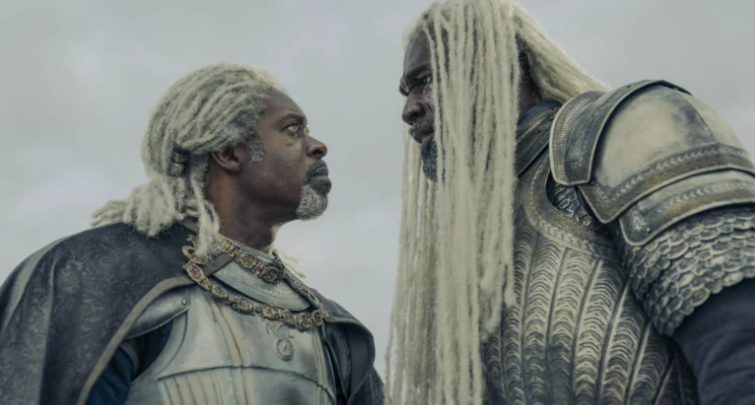
Wil Johnson, left, and Steve Toussaint in HBO's "House of the Dragon." (Photo by Ollie Upton/HBO)
Editor’s note: The following article is an op-ed, and the views expressed are the author’s own.Before I even get into this, let me (re)state for the record that when I say “white people,” I do not mean, all white people. It is more of the general you versus the specific you type of reference. I know y’all like to get your panties in a bunch about this; I have the inbox messages to prove it, but I want you to know that if it doesn’t apply? You are more than welcome to let it fly. Please and thank you. I am currently on a white tears diet, and I don’t need yours.
Speaking of white tears, have you seen all the white tears all over the internet because both the new Game of Thrones series and the new Lord of the Rings series have dared to cast Black actors in primary roles?
If you have not, please allow me to get you caught up a little bit.
The Lord of the Rings: The Rings of Power, an am*zon Prime series that is a prequel to The Lord of the Rings franchise, and House of the Dragon, an HBO series that is a prequel to Game of Thrones, both debuted recently to rave reviews. Even as fans rave daily about both series, there is a rumbling in the background of disgruntled “fans” who are upset that Black actors are in roles that they believe should be played by white people because there were actually no Black people during the time of dragons and wizards and magic and stuff.
Seriously, that is indeed the logic of some arguing against the Black cast members. Some have been straightforward with it and made outright racist remarks. I have also seen others say on Twitter that they think the shows are being too “woke” (remind me to talk about the bastardization of that word at another time) and interjecting “politics” into their fantasy stories.
Because putting make-believe Black characters in make-believe stories about make-believe people in make-believe lands that do not even exist is totally political and woke and beyond the pale.
This comes from the same group of people who read the Bible, know Jesus was a Middle Eastern Jewish man and still made him white with blonde hair and blue eyes in all of their iconography. I guess it’s totally OK to play loose and fast with the “word of God,” but absolutely offensive to do so with fantasy characters written out of someone’s imagination.
We’ve seen this before, of course.
It really bothers (some) white people that Black people get cast in their favorite make-believe stories. Maybe we are infringing on their ability to make believe that we don’t exist. Whatever the case may be, it’s seriously time to get over it, like Whoopi said.
If you can believe that fire-breathing, flying dinosaurs not only exist but will allow certain individuals—from a certain family with thousands of generations of inbreeding and some genetic mutation that makes a portion of them come out with dragon-like qualities themselves—to hop on their backs and order them to breathe hellfire on command, it really should not be that difficult to imagine that some of those inbred individuals might have dark skin, violet eyes and that weirdo lacefront hair color. Please.
In summation, I want y’all to stop being so stingy with the ball. We want to play too, and let’s face it, we are good at a lot of these things just like (some) of y’all are, so calm down and enjoy the show.
Hey. At least it will be easier for you to know these characters by name. There aren’t that many of us in it.
Monique Judge is a storyteller, content creator and writer living in Los Angeles. She is a word nerd who is a fan of the Oxford comma, spends way too much time on Twitter, and has more graphic t-shirts than you. Follow her on Twitter @thejournalista or check her out at moniquejudge.com.MY THOUGHTS
I completely oppose that title. There are already fantasy stories with black people. this isn't about Black people in fantasy stories, this is about characters being manipulated for no reason. I am a writer. Admittedly, no where near known or popular like Tolkien or George RR Martin but in most of my fantasy stories there are no whites. Does this mean black characters in my stories must be turned white? Its silly. Authors like Nnedi Okarafor or Octavia Butler or Nalo Hopkinson created fantasy stories with a plethora of black people. Even if Tananarive Due or Steven Barnes or Jordan Peele don't have a fantasy work that may fit some theme, they damn sure can write one. Finance their work into shows and give the Black actors the Black roles. This isn't about negative bias. This is about forcing monoracial fantasy environments to reflect the USA. I read the books. MArtin has black people, they are called summer islanders and far more Black people live in sothoryos. Tolkien has dark skinned Black people, they are in Far HArad. Both of those places aren't involved in the stories in the books in question in a major way. Cause if Corlys Valearyon can be played by a black thespian then why can't anansi be played by a white one? why can't John Henry? will I like it if John Henry is played by a white man? hell no. But, if a white fantasy character can be portrayed by someone not white then black people can't protest when a black fantasy character is played by someone not black. The door swings both ways. I wrote in email to George RR Martin's publicist and the Tolkien estate. With no hope to reply, let me write a story about Sothoryos or Far Harad. I offer other black writers do the same. Then the black thespians can have even more roles in the Black places in the Map of MArtin's or Tolkiens world. I oppose this line of thinking. IT isn't about negative bias, it is about getting fantasy worlds to reflect the multiracial reality of the USA. But, neither of Tolkien's or MArtin's fantasy worlds are based on the USA. Both are based on north western Europe between circa 900 and 1300 after the death of jesus. Where Black people were not present in any noticeable form. I despise this line of thinking.
-
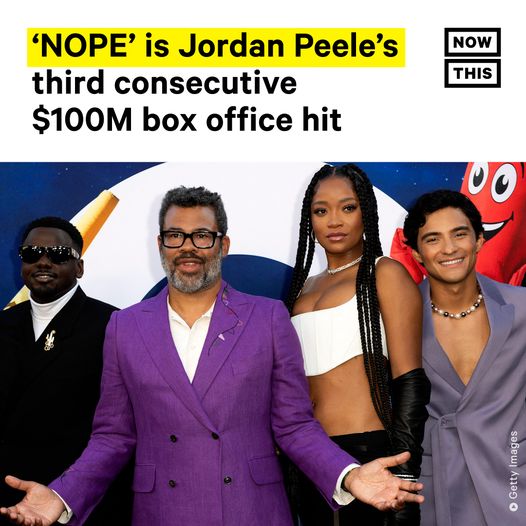
congrats
 Get Out/US/Nope 300 million dollars ,well done, glad his art meets the audience well done
Get Out/US/Nope 300 million dollars ,well done, glad his art meets the audience well done
Post with Peele
Searched for 'peele' in Status Updates (aalbc.com)
Post script: Keke Palmer is taller than Jordan Peele plus Kaluuya ? She must be on a platform, I hope she is:)
-
REVIEW OF NOPE FROM MOVIES THAT MOVE WE
Some points without spoiling the review
8:04 or 23:44 Nike - the role of Perception in the film
25:40 Nicole - description of the films place in genres
33:35 Both- the nonchalance against common sense:) very funny
37:54 Nike- Lovely real life example of how people judge a film strictly, advertise their judgement to influence others, but don't even fully assess a film, by their own admission. But how can one recant in real time
40:16 Nicole- yes, I concur to the relationship to both Peele and the director you mention who in their time in the sun:) had the ability to make films that be thought provoking or artful WHILE also commercial. I don't think it is unimportant to say that Nope covered its cost of production.
49:44 Both - Keith David is a very fortunate thespian. Not merely being a thespian having less opportunty, cause he is black and media in the USA is owned by whites, who do favor giving opportunity to whites. But, Keith David has been able to be part of many thoughtful films in the film itself or its role in genre setting in various genres: The THing;The Live;Pitch Black;Nope<science fiction>[Keith David has successfully been a black character in a science fiction film that has lived at the end more than once, died before the 15 minute mark and died just before the end:) ] / Platoon<war film>/ Bird<documentary> [where he played a criminalized version of buster smith] /Roadhouse<action>People don't realize how some films hollywood has been heavily inspired by and never been able to repeat /The Quick and the Dead<western> [a female led western back when it wasn't so easy to see being financed]/PRincess Mononoke <anime>[the studio ghibli collection itself is something else... his voice is everywhere, ever since, and shout to tv show gargoyles]/Crash <social commentary vignettes>[hollywood has tried to find the next crash since crash]/The Inheritance<My personal favorite film with him in it, the story is a rare thing in its message>
Prior Movies That Move We entry
https://aalbc.com/tc/profile/6477-richardmurray/?status=1989&type=status
MOVIES THAT MOVE WE entries
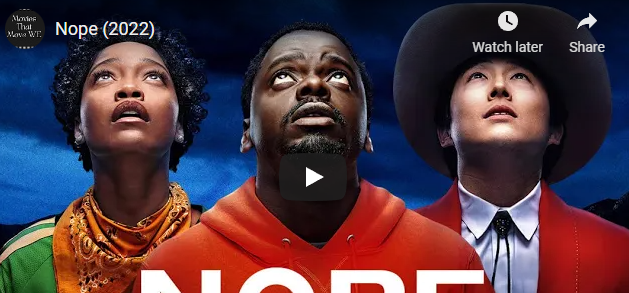
-
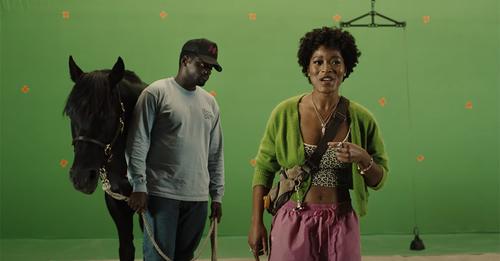
Congrats to Jordan Peele side all the creators involved in NOPE
Box Office: Jordan Peele’s ‘Nope’ Opens to No. 1 With $44 Million
By Rebecca Rubin
Audiences responded with a resounding “yep” to Jordan Peele’s science-fiction thriller “Nope,” which topped the box office with its $44 million debut.
Those ticket sales were slightly behind projections of $50 million and fall in between the results of Peele’s first two films, 2017’s “Get Out” (which opened to $33 million) and 2019’s “Us” (which opened to $71 million). “Nope” may not have cemented a new box office record for Peele, but it demonstrates the director’s popularity at the movies and marks a strong start for an original, R-rated horror film.
In fact, “Nope” stands as the highest opening weekend tally for an original film since “Us” debuted more than three years ago. Yes, that includes Quentin Tarantino’s star-studded “Once Upon a Time in Hollywood,” which started with $41 million in July 2019.
“The opening isn’t as big as ‘Us,’ but it’s still extremely impressive,” says David A. Gross, who runs the movie consulting firm Franchise Entertainment Research. “The weekend figure is far above average for the genre.”
It’s worth noting that Peele’s sophomore feature “Us,” a scary story about menacing doppelgängers, enjoyed an especially huge opening weekend because it followed the runaway success of the Oscar-winning “Get Out.” After his directorial debut captured the zeitgeist by delivering scares while encouraging audiences to think, fans of the filmmaker were more than a little eager to watch Peele’s next mind-bending nightmare. Though Peele still has outsized goodwill with audiences, box office expectations for “Nope,” another anxiety-inducing social thriller, should have been comparatively a little more Earth-bound.
“Nope” cost $68 million, which is significantly more than “Get Out” (with its slender $4.5 million budget) and “Us” (with its $20 million budget). So the movie will require a little more coinage than Peele’s past films to turn a profit. Word-of-mouth will be key. “Get Out” and “Us” were wildly successful in theaters, with each collecting $255 million at the global box office. “Nope” does not open at the international box office until mid-August.
“Nope” reunites Peele with “Get Out” star Daniel Kaluuya — and adds Keke Palmer and Steven Yeun to the mix — in the story of siblings who live on a gulch in California and attempt to uncover video evidence of a UFO. Critics were fond of “Nope,” which holds an 82% on Rotten Tomatoes. Audiences gave the film a “B” grade, the same CinemaScore as “Us.”
Universal’s president of domestic distribution Jim Orr points out that “Nope” is appealing to all demographics; according to exit polls, 35% of ticket buyers were Caucasian, 20% were Hispanic, 33% were African American and 8% were Asian. He says that’s a good sign in terms of its theatrical run.
“We’re thrilled with the results this weekend,” Orr says. “Jordan Peele is an incredible talent. His films are layered and thought-provoking and ridiculously entertaining.”
Since “Nope” was the only new movie to open this weekend, several holdover titles rounded out North American box office charts.
...ARTICLE LINK
https://variety.com/2022/film/box-office/nope-box-office-opening-weekend-jordan-peele-1235324105/
Post Script NOTE: the purple outfit in the article linked above
-
as a fellow truth telling writer, I realize it takes time for us to learn how to be commercial writers, a finesse must be learned that I haven't, that Rod Serling was able to learn on the go so to speak, that I think most of the most profitable writers today comprehend
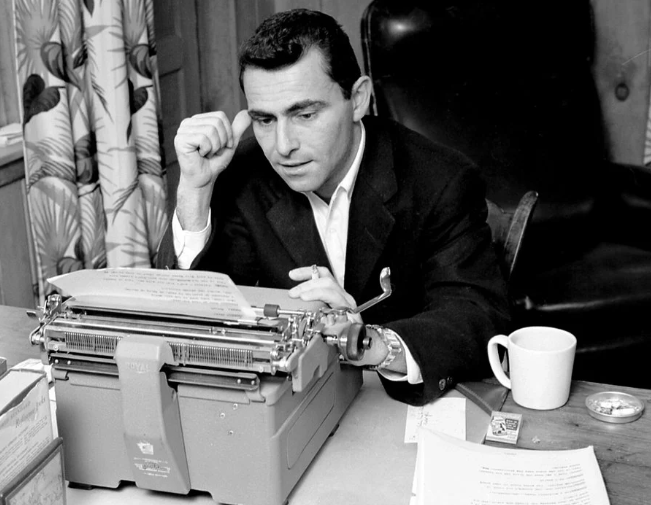
An Early Run-In With Censors Led Rod Serling to ‘The Twilight Zone’
His failed attempts to bring the Emmett Till tragedy to television forced him to get creativeJackie Mansky
April 1, 2019
In August of 1955, Emmett Till, an African-American boy from Chicago was abducted, beaten, and shot while visiting family in Mississippi. A nation divided by race dug in its feet in the aftermath. While Jet magazine disseminated photographs from the open-casket funeral, showing the full mutilation of the 14-year-old’s corpse, another story played out in the courtroom. That fall, an all-white jury acquitted the two killers, both white, of all charges.
The miscarriage of justice proved a galvanizing point in the Civil Rights Movement. Rod Serling, a 30-year-old rising star in a golden age of dramatic television, watched the events play out in the news. He believed firmly in the burgeoning medium’s power for social justice. “The writer’s role is to be a menacer of the public’s conscience,” Serling later said. “He must have a position, a point of view. He must see the arts as a vehicle of social criticism and he must focus the issues of his time.”
Soon after the trial concluded, Serling, riding off the success of his most well-received teleplay to date, felt compelled write a teleplay around the racism that led to Till’s murder. But the censorship that followed by advertisers and networks, fearful of blowback from white, Southern audiences, forced Serling to rethink his approach. His response, ultimately, was “The Twilight Zone,” the iconic anthology series that spoke truth to the era’s social ills and tackled themes of prejudice, bigotry, nuclear fears, war, among so many others.
Tonight, “The Twilight Zone” enters another dimension led by Jordan Peele. Peele has emerged as one of Hollywood’s most interesting auteurs, using a toolbelt of humor, horror and specificity to explore the human experience, especially through the construct of race. That through line can be found throughout his body of work from the witty sketch-comedy episodes of “Key & Peele” to his latest offering, the box-office record-setting Us. His perspective makes him a natural choice to step in as host and executive producer of the buzzy reboot coming to CBS All Access.
But unlike Serling, Peele will also be able to take the franchise in a direction that the dramatic writer wanted to go but was never able to get past the Cold War censors during the original show’s run from 1959-1964. For all that his Oscar-winning directorial debut Get Out, for instance, shares the DNA of “The Twilight Zone,” Peele’s allegory about black people in white spaces is direct in a way that Serling could never have been. To get on air, the story would have been forced to compromise in some way—camouflaging its intent by setting the story on a distant planet or another time period. Peele commented on that in a recent interview < https://www.nytimes.com/2019/03/26/arts/television/jordan-peele-twilight-zone.html > with Dave Itzkoff of the New York Times: “It felt like, if Serling were here, he’d have a lot to say and a lot of new episodes he couldn’t have written back in his time,” he said.
Few examples tell Serling’s struggles better than his attempt to bring the Till tragedy to television. Already, when he first pitched the idea to the advertising agency representing the U.S. Steel Hour, an hour-long anthology series on ABC, Serling was pre-censoring himself. Aware that he’d have to make concessions to get the script on screen, he sold the representatives on a story of a Jewish pawnbroker’s lynching in the South. When the idea was greenlit, Serling worked on that script as well as an adaptation for Broadway, where he knew he would have the freedom to tell Till’s story more directly, centering that plot around a black victim.
But Serling misjudged just how restrictive 1950s television could be. After he mentioned that his script-in-progress was based on the Till murder trial in an interview with the Daily Variety, papers around the country picked up the scoop. Thousands of angry letters and wires from the likes of white supremacist organizations followed, threatening both Steel Hour and ABC, who quickly capitulated and ordered changes to Serling's script. Recounting the incident several years later during an interview < https://books.google.com/books?id=C_Z1DwAAQBAJ&pg=PA137&lpg=PA137&dq=to+suggest+an+unnamed+foreigner,+then+the+locale+was+changed+from+the+South+to+New+England,+and+Im+convinced+they+would+have+gone+up+to+Alaska+or+the+North+Pole+using+Eskimos…except+I+suppose+the+costume+problem+was+of+sufficient+severity+not+to+attempt+it.&source=bl&ots=HUvHNRKWDW&sig=ACfU3U0-tiDUmMXyHM37Ig7rlkS6entsrQ&hl=en&sa=X&ved=2ahUKEwjoxrPwkKbhAhUGj1kKHT0zBAcQ6AEwAHoECAkQAQ#v=onepage&q&f=false ;
“Station owners and advertising agencies were afraid to offend any segment of their white audiences, even racists, for fear of losing income,” explains < https://www.nytimes.com/2002/10/20/arts/television-radio-battling-the-bottom-line-in-tv-s-earliest-days.html > journalist Jeff Kisseloff, author of The Box: An Oral History of Television, 1920-1961. As television gained a national audience in the 1950s, the creative freedoms that permeated the earliest days of the medium were quickly being pushed out in an attempt to sell to a white consumer market. Black purchasing power wasn't taken into account. “[A]s late as 1966, one study indicated that black performers constituted 2 percent of the casts of commercials,” according to research < https://books.google.com/books?id=PP1tHJN8h6AC&printsec=frontcover&dq=james+l+baughman&hl=en&sa=X&ved=0ahUKEwjoxsr8o6fhAhUMxVkKHdQhAdMQ6AEIKjAA#v=onepage&q=james l baughman&f=false> by media theorist James L. Baughman. The great Nat King Cole surmised the situation at hand succinctly, “Madison Avenue is afraid of the dark.”
When Serling's teleplay,“Noon on Doomsday,” finally aired on April 25, 1956, any hint of the South was removed from the plot; not even a Coca-Cola bottle could appear, lest viewers invoke the idea of the region. Instead, the opening crawl made clear that the story was set in New England. (Really, all that mattered was that it was set far away from the South: “I’m convinced,” Serling said in the Wallace interview, “they would have gone up to Alaska or the North Pole…except I suppose the costume problem was of sufficient severity not to attempt it.). The victim was now depicted as an unknown foreigner. “Further,” Serling fumed, “it was suggested that the killer in the case was not a psychopathic malcontent but just a good, decent, American boy momentarily gone wrong…”
It should be noted that some details of this ordeal might be exaggerations on Serling’s part or conflations of the two scripts he was working on simultaneously for stage and screen; Rod Serling Memorial Foundation board member Nicholas Parisi cautions in his recent biography of Serling that “a good deal of myth has crept into the narrative surrounding the production of ‘Noon on Doomsday.’” For instance, the Jewish Southerner that Serling said was initially cast as the victim, he writes, actually appeared in a draft of the theatrical script, instead. The unknown foreigner was already in Serling’s initial teleplay draft.)
Whatever the case, by the time everything was said and done, the message that aired in the teleplay of “Noon on Doomsday” was thin and garbled. When Serling read the New York Times’ review of it, he realized just how so. In a letter to a friend, he wrote: “I felt like I got run over by a truck and then it back[ed] up to finish the job.” Meanwhile, his relationship with the Theater Guild, whom he’d sold an option of the Broadway script and also produced the teleplay, had soured. Despite attempts to salvage it, the theatrical version of the story was not performed or published in his lifetime.
But Serling wasn’t done with the Till tragedy. Once again, this time for CBS’ “Playhouse 90” series, he attempted to tell the story of a lynching in a small town, this time setting the plot in the Southwest. After haranguing from CBS executives, Serling had to move the story back 100 years, erase any direct allusion to Till, as well any black and white racial dynamics in the script. Unlike “Doomsday,” however, this production, titled “A Town Has Turned to Dust,” still communicated, if more universally, Serling’s desired message on prejudice and hatred. The closing soliloquy, delivered by a journalist signing off a telegram to his editor, already had the feel of the best of the “Twilight Zone” epilogues Serling himself would go on to deliver:
Dempseyville got rain tonight for the first time in four months. But it came too late. The town had already turned to dust. It had taken a look at itself, crumbled and disintegrated. Because what it saw was the ugly picture of prejudice and violence. Two men died within five minutes and fifty feet of each other only because human beings have that perverse and strange way of not knowing how to live side by side, until they do, this story that I am writing now will have no end but must go on and on.
Scholar Lester H. Hunt argues that the lessons Serling took from the experiences of “Doomsday” and “Dust” laid the groundwork for what was to come in “The Twilight Zone.” Based on the censors, Hunt writes in an essay < https://books.google.com/books?id=qOfuslNpHE4C&printsec=frontcover&dq=twilight+zone+rod+serling&hl=en&sa=X&ved=0ahUKEwjA7ILt0KLhAhXpx1kKHQe8C_oQ6AEIWDAI#v=onepage&q=twilight zone rod serling&f=false > , “[Serling] changed, rather abruptly and driven by the pressure of circumstance, from an artist who thought it was his highest calling to comment on the problems of the day by depicting them directly to one who commented on principles and universals involved, not merely in the problems of the moment, but of human life itself.”
Or, as Serling himself later put it, “If you want to do a piece about prejudice against [black people], you go instead with Mexicans and set it in 1890 instead of 1959.”
Serling had also learned his lesson from his earlier dust-up with the Daily Variety. In his interview with Wallace, he demurred about whether or not his new show would explore controversial themes. “…[W]e're dealing with a half-hour show which cannot probe like a [Playhouse 90 production], which doesn't use scripts as vehicles of social criticism. These are strictly for entertainment,” he claimed. After Wallace followed up, accusing him of giving up “on writing anything important for television,” Serling easily agreed. “If by important you mean I'm not going to try to delve into current social problems dramatically, you're quite right. I'm not,” he said.
Of course, that couldn’t have been further from the case. His missteps with adapting the Till tragedy for television forced him to realize that to confront issues of race, prejudice, war, politics and human nature on television he had to do so through a filter.
The Twilight Zone is actually a term Serling borrowed from the U.S. military. Serling, who served as a U.S. Army paratrooper in World War II, an experience that marked many of the stories he went on to write, knew it referred to the moment a plane comes down and cannot view the horizon. As the title of the anthology drama, it spoke to his mission for the show: to be able to tell bold stories about the human conditions on screen by obscuring the view somehow.
As Peele steps into Serling's iconic role, he does so knowing he has a chance to speak more directly to those concerns. The veil that held Serling, who died in 1975, back has lifted somewhat, opening up the narrative for bolder stories to now enter “The Twilight Zone.”
ARTICLE
IN AMENDMENT
to see some pretty photos, I wish my underater train design could had been implemented , fortunate engineers
China completes Rail Line around Taklamakan Desert on the old Silk Road
By baronmayaChina has finished the new Hotan-Ruoqiang rail line and completed the circle around the huge Taklamakan Desert on the old Silk Road.
Ancient Silk Road travelers cursed China’s largest desert as Takla Makan, an ominous Persian-Turkic expression that translates as “Enter and you may never Return.”

Undeterred by its sandstorms and merciless terrain in the oblong basin north of Tibet’s glacier-packed peaks, China has announced the completion of the final section of a Taklamakan Desert railway loop line, the world’s first to encircle a desert.
Elsewhere, China is constructing Maglev train systems capable of hurtling passengers and freight hundreds of miles per hour, including an underwater route near Shanghai to reach tiny offshore islands.
These latest railways increase China’s military, industrial, agricultural and political prowess, amid escalating rivalry with the USA over each nation’s capabilities.

The Taklamakan Desert railway loop also allows Beijing greater access to rebellious Xinjiang province’s Kashgar, a distant southwestern city near vulnerable borders with India, Pakistan, Afghanistan and Kyrgyzstan.
Kashgar and elsewhere in Xinjiang comprise a large population of restive Muslim Uighurs of ethnic Turkic origin.
The railway loop also enables exploitation of the Tarim Basin oilfield, estimated to cover 350,000 square miles, or 560,000 square kilometers, under the Taklamakan’s huge dunes and shifting sands.
According to China’s official Xinhua news agency, workers tighten the screw of the rail and finished the final Hotan-Ruoqiang link on September 27, 2021. From the oasis town of Hotan, an existing line continues to Kashgar.

This railway line runs through the southern edge of the Taklamakan Desert,” said Yang Baorong, chief designer of the final 513-mile section. Sandstorms pose a serious threat to railway construction and operation, as tracks can be buried underneath.
Tickets to use this newest link are expected to go on sale in June 2022, allowing travelers to ride the entire loop to encircle the Germany-sized Taklamakan, which is second only to the Sahara Desert in size.
The Taklamakan loop is hailed by Beijing as a way to help the region, especially Xinjiang’s impoverished southern edge near northern Tibet.
That edge includes an existing Golmud-Korla Railway which now joins the new loop. Other trains already go south from Golmud to Lhasa in Tibet, and future plans envision continuing those tracks south from Lhasa to Nepal’s capital Kathmandu.
More than 2,000 years ago, Bronze Age inhabitants buried mummies in the Taklamakan, according to a French-funded excavation. As the desert expanded southward, ancient kingdoms crumbled into ruins or were buried.
These included the flourishing Loulan kingdom on vast Lake Lop Nur, before its water evaporated in the 5th century.
By constructing a railway around the desert, Chinese engineers have recreated Silk Road caravan routes that linked China and Europe by skirting the Taklamakan’s rim.
Buddhist monks also trudged those routes spreading their religion east, until medieval sea routes replaced hazardous overland treks to East Asia.
The Taklamakan Desert parches 124,000 square miles and is about 600 miles east to west.

It bulges up to 260 miles across, flanked by the snow-capped Tian Shan range on the desert’s north and the Kunlun Mountains along its southern curve. Rugged Pamir peaks form its western ridge.
The railway had to cross, or route around, elevations up to 5,000 feet. Grass grids were laid across 165 million square feet of dunes which were virtually devoid of plant life, officials said.
Anti-desertification programs planted 13 million seedlings. In the harshest, most unpredictable zones – battered by sandstorms and smothered by swollen dunes – engineers designed lengthy bridges above chaotic sand.

Closer to Beijing meanwhile, a Maglev train project is starting in Shanxi, a north-central province. Magnets allow Maglev train carriages to float without wheels.
The high-speed train uses superconducting magnetic levitation technology to disengage from the ground to eliminate frictional drag.
This Maglev uses “a near-vacuum internal duct line to dramatically reduce air resistance, to achieve travel speeds of more than 1,000 kilometers-per-hour.
China already boasts the world’s fastest commercial Maglev on a 19-mile route in Shanghai, linking Pudong Airport to an urban metro system on the city’s edge within seven minutes, at up to 268 mph.
Nearby, a bullet train is preparing to zip under the sea at 155 miles-per-hour. Construction is well underway,” the UK-based website IFL Science reported in May 2021.

It would be “the world’s first underwater bullet train, which would extend nationally from Ningbo, a port city near Shanghai, to Zhoushan, an archipelago of islands off the east coast.
Covering a 47.8-mile stretch of almost entirely newly-built railway, the new route will include a 10-mile underwater section.
Verified post
https://weibo.com/2286908003/LxXRGg1aUArticle
https://cosmoschronicle.com/china-completes-rail-line-around-taklamakan-desert-on-the-old-silk-road/
-
NOPE trailer, my thoughts, article
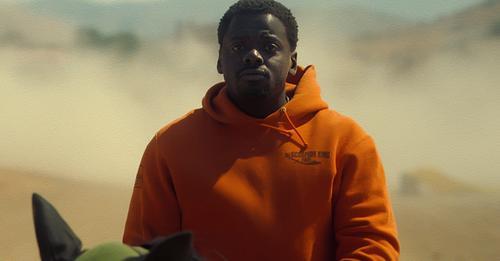
MY THOUGHTS
ok... What did i see... the main characters, kaaluya and keke palmer live in some western usa area, black cowboy heritage ok.. this is a financially base area. From a simple glance this is the intercontinental railroad movie, black horse riders, an asian with a cowboy hat on so that is the human side... what is unnatural three things: a cloud that is very thick, and is being influenced. Dust clouds exists but they don't come absent a slow growth of dust. So a thick cloud on a sunny day at ground level at speed absent dust around is unnatural. Next is a body lifting from the ground straight into space. This reminds me of a film with julianne moore about a woman who is trying to remember her child and creatures foreign to earth actually control humanity and use it for experiments. In the film's case to see if the love of a child occurs before or after a child exits the womb. In the film whenever anyone became a threat the aliens lifted them into the sky like they are on a string. functionally a specific while potent gravitional field is being generated. In my mind maybe a neutron array. but the kind of device to house such a system, right now escapes me. Last is the two fingered fist of a creature under a blanket/cloth/cover bumping fist to a human being. ... A sense of surveillance and a robotic system is present. ... so putting all these things I saw together... I think what we have here is humanity is under the control of creatures, whose descendency is unknown, maybe they are ancient pre humanity , like the guyver , or they are truly extraterrestrial. These creatures are looking for another creature, maybe it is related to them , maybe it is not , but it is also not human. And I think it travels by a cloud... in my mind I think of cowboys and aliens a little as well. A story where the influence of the alien is one and done, no Nope 2 and Nope the return or Nope Nope.ARTICLE
'Nope': Jordan Peele explains meaning behind his mysterious new movie's titleLAS VEGAS – Jordan Peele is doling out a few more details about his cryptic new thriller.
The comedian-turned-filmmaker behind "Get Out" and "Us" returns to multiplexes this summer with "Nope" (in theaters July 22), a sci-fi/horror flick starring Daniel Kaluuya, Keke Palmer and Steven Yeun.
After premiering a terrifying teaser during this year's Super Bowl, Peele gave convention-goers at CinemaCon a clearer look at what's in store with the debut of the movie's first full-length trailer Wednesday.
Given that it won't be released to the public for "several more weeks," Peele asked the room full of theater owners and journalists to keep the trailer's secrets to themselves. But it's safe to say the new footage earned raves on social media, with people calling it "super cool," "ominous and creepy," and that Kaluuya and Palmer – playing scheming siblings who train horses – are "absolute stars."
Introducing the trailer, Peele said he wants to "retain some mystery" around "Nope," whose plot fans have feverishly tried to decipher online.
"Some (theories) get kind of close," while others "are nonsense," Peele said. But he would allow that it's "definitely a ride," describing it as a movie for "the person who thinks they don't like horror movies."
As for the film's monosyllabic title, Peele explained that it was inspired by the reactions he hopes "Nope" elicits.
"I love titles that reflect what the audience is thinking and feeling in the theater," he said. "Especially Black audiences: We love horror, but there's a skepticism, like, 'You're not gonna scare me, right?' I'm personally going to thrive on the times I hear 'Nope!' in our theater (when the film is released)."
Peele, who won the best original screenplay Oscar for "Get Out" in 2018, said he sees it as his "privilege and responsibility to try and make new films and tell original stories.
"Until someone tells me I can't, my plan is to bring these new ideas and new dreams and new nightmares to the big screen."
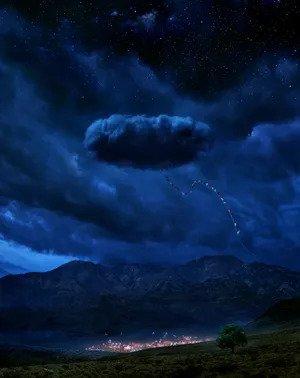
-

Yeah I have no idea what this film is about, but I'm looking forward to seeing it. I also have no interest in trying to figure out what it is about; I'm pretty confident that it will be something different -- which is all I care about

I liked Get Out, and am not surprised it won an Oscar but did not care for Us. I did not get that film...

-
-
 1
1
-
- Report
-

-
-
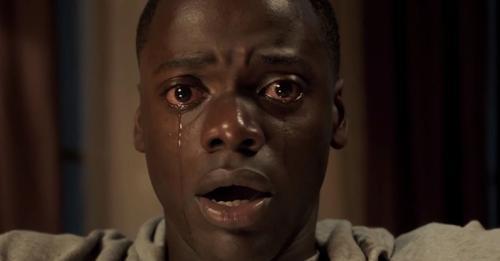
ARTICLE
Daniel Kaluuya:“I ask the script, ‘What do you want me to do?’”
(arranged by Carmichael Phillips)
If you’ve ever seen the Jordan Peele cult classic horror film, Get Out, then you already know that Daniel Kaluuya is an incredibly gifted and natural actor, with the ability to make you forget you’re watching an acting performance. He never pushes or forces his performance. It just seeps out as smoothly as sweet honey.
If his performance in Get Out is any indication, Kaluuya has a wonderful acting career ahead of him. Indeed, he earned an Academy Award nomination for Get Out, even though it was his first real breakout role. And at the 2021 Oscars, he received an Academy Award for Best Supporting Actor for his role in Judas and the Black Messiah.
With an already impressive, if developing career, one might question, “How does he do it? What’s his secret?”
In a recent interview with Backstage, Kaluuya briefly described his process to character development.
“I ask the script, ‘What do you want me to do?’” Kaluuya explains.
“Especially if I love a script…I let it tell me what it is. That’s how you can always be OK in this acting thing.”
Kaluuya went further, to add a little more detail:
“I’ll just read a script every day, set it aside, read the script, set it aside, every day.”
“And then I would do this exercise where I write everything someone says about you, write everything you say about yourself, write everything you say about someone else, and write the facts.”
“Like the facts are if a character has a brother, he has a grandma, any facts that are in the script, write those down. Your character lives in what you say about yourself or what someone says about you.”
Kaluuya used this approach for his latest role. In Judas and the Black Messiah (2021), he portrayed Fred Hampton, a charismatic leader in the Black Panthers’ Illinois Chapter in the 1960’s, who was gunned down by police.
Once again, his approach proved its value. In addition to winning an Academy Award for Judas and the Black Messiah, Kaluuya also won both a Golden Globe Award and a British Film Academy Award.
MY THOUGHTS
Kaluuya is correct, in screenplays all to often, details of a character exist that actors when they portray the character don't seem to cognize. In get out you comprehend his friendship with his friend who works for the airports. you cognize he is aware of the world outside his relationship with his white girlfriend , you sense his ignorance to her or her family and you watch that ignorance slowly ebb away , till he has his former girlfriend strangled as she is bleeding to death. Where she reveals her obsession/her fantacism while he reveals he is still himselfARTICLE LINK
https://actingmagazine.com/2021/05/daniel-kaluuya-i-ask-the-script-what-do-you-want-me-to-do/
-
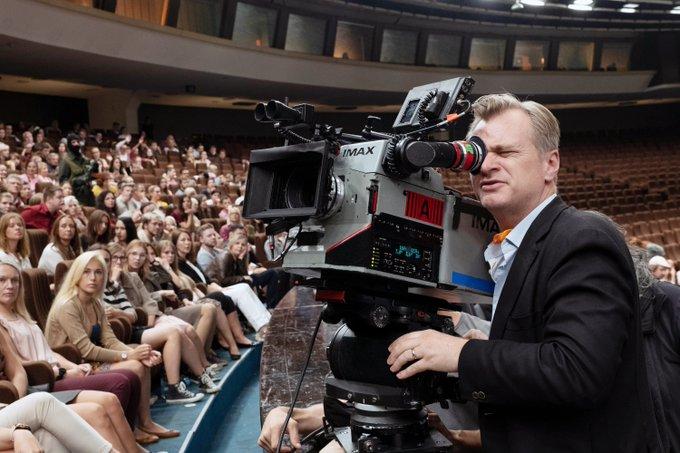
I quote Variety:
By backing #Oppenheimer, Universal is making a bet that the right director can still get audiences excited to visit cinemas for original content. The film, which isn’t due in theaters until 2023, will need to defy the odds to become commercially successfulThe article
Why Christopher Nolan’s $100 Million WWII Drama ‘Oppenheimer’ Could Be the Last of Its Kind
By Rebecca Rubin < https://variety.com/author/rebecca-rubin/ >
Christopher Nolan’s next movie “Oppenheimer,” a $100 million-budgeted historical drama about physicist J. Robert Oppenheimer and the creation of the atomic bomb, could be considered one of an endangered species.
These days, it’s rare for traditional studios to pump nine figures into a film that isn’t inspired by popular toys, novels or comic books. Even before COVID-19 upended the moviegoing landscape, audiences had been gravitating toward superheroes and science-fiction spectacles — and not much else. That reality has made it increasingly difficult for Hollywood to justify the economics of greenlighting expensive movies that aren’t based on existing intellectual property. They’re a bigger risk, not only in recouping investments for studios, but also in generating profits, spawning sequels and leveraging consumer product riches. No matter how well people receive Nolan’s film, it’s unlikely J. Robert Oppenheimer’s face will adorn t-shirts or lunch boxes.
By backing “Oppenheimer,” Universal Pictures is making a bold bet that the right director can still get audiences excited to visit cinemas for original content. The film, which isn’t due in theaters until 2023, will need to defy the odds to become commercially successful. On top of its $100 million production budget, the studio will need to spend $100 million more to properly promote the film to global audiences. Because Nolan’s contract guarantees he receives first-dollar gross — an increasingly uncommon perk that grants the filmmaker a percentage of ticket sales — it will take $50 million to $60 million more to achieve profitability than it would take another film of similar scope. Consequently, insiders at rival studios estimate “Oppenheimer” will need to generate at least $400 million at the global box office in order to turn a profit.
That box office benchmark is one that Nolan’s films haven’t had trouble clearing in the past decade, with the exception of “Tenet,” which opened in theaters at a time when COVID-19 vaccines were still months away. And despite the circumstances, the Warner Bros. cerebral thriller — starring John David Washington and Robert Pattinson — managed to collect $363 million worldwide. “Tenet” cost more than $200 million, making it nearly impossible to turn a profit in those conditions. When it comes to Nolan’s other original properties, 2010’s “Inception” grossed $836 million globally, 2014’s “Interstellar” made $701 million globally and 2017’s “Dunkirk” collected $526 million globally. In other words, Nolan is a filmmaker with an enviable box office track record.
Those who closely follow the industry point out that “Oppenheimer” won’t be the kind of gripping mind-benders that audiences have come to expect from Nolan, such as “Inception” or “Memento.” Instead, it’s a historical drama that’s firmly rooted in fact and physics. Unlike “Dunkirk,” which captures the heroism of British forces during the early days of World War II, “Oppenheimer” tells a darker story, one that exists in the moral murk of the past and is not only divisive, but firmly American. That could limit interest overseas, where Nolan’s films tend to make the bulk of their revenues.
None of this means people in the movie theater business are betting against Nolan. The reason that Universal’s chairwoman Donna Langley made it her mission to court Nolan after his relationship with Warner Bros. grew strained is that he’s one of the few directors who can take a bold swing and rake in hundreds of millions at the box office. It’s especially valuable at a time when Hollywood appears to be scraping the bottom of the barrel for IP that can be spun into cinematic gold. Case in point: There are (real) movies in the works based on the card game Uno, the crunchy snack Flamin’ Hot Cheetos, and the invention of Viagra. Because not every project can be derived from Marvel, Star Wars, James Bond, Jurassic World and Fast & Furious, studios are turning to filmmakers with unique perspectives who can launch a film based on their name alone. Privately, other Hollywood players have voiced their desire to see “Oppenheimer” succeed because it would encourage studio executives and financiers to take more chances on new ideas.
“[Nolan] is a unique talent with a very loyal fanbase. If you were to say someone else was doing a period piece about J. Robert Oppenheimer, I would say it would be difficult to get made,” says producer Peter Newman, the head of NYU’s Tisch School of the Arts’ MBA/MFA program. “Here, you know you’re going to get something different and original.”
There aren’t many filmmakers who are given the opportunity to create movies around new and unfamiliar ideas at that budget level, at least, not at traditional studios. (In a sign of changing times, Steven Spielberg, once a streaming service skeptic, forged a partnership for his company Amblin to produce new feature films yearly for Netflix.) When they work, in the case of Quentin Tarantino’s ode to 1960s showbiz “Once Upon a Time in Hollywood,” the studio and filmmakers alike can reap the benefits. Sony shelled out roughly $90 million to produce “Once Upon a Time in Hollywood,” which starred Leonardo DiCaprio, Brad Pitt and Margot Robbie and grossed $375 million at the global box office. When they flop, like Ridley Scott’s big-budget period piece “The Last Duel,” starring Ben Affleck, Matt Damon and Adam Driver, or Roland Emmerich’s $100 million-budgeted war drama “Midway,” the losses can be ruinous.
Filmmakers like Jordan Peele and Judd Apatow have a similar ability to churn out hits, but their movies don’t cost nearly as much to make. Recent would-be blockbusters or adult-targeted movies with sizable budgets, such as Michael Bay’s “6 Underground,” Aaron Sorkin’s “Trial of the Chicago 7,” David Fincher’s “Mank” and “Red Notice” starring Dwayne Johnson, Ryan Reynolds and Gal Gadot, were set up by or sold to Netflix. The streamer, as well as its competitors, doesn’t report box office grosses and relies on luring subscribers with fresh content, so it’s impossible to know what kind of financial impact those movies had.
Nolan could have easily sold “Oppenheimer” to a streaming service, which would have guaranteed him a massive payday without being subjected to the scrutiny of box office reporting. But he’s a big supporter of the big-screen experience and the struggling film exhibition industry.
Since “Oppenheimer” isn’t expected to debut in theaters until summer 2023, plenty could change in the movie theater business by then — for better or worse. There’s a chance it could launch in an environment that’s even more hostile to tentpoles that aren’t of the comic book ilk. Or, moviegoers could be ready to look beyond the constant drip of Batman, Superman and Spider-Man adventures and watch something that doesn’t involve grown men in tights.
With an original property, marketing executives have to familiarize audiences with the property while also enticing them to watch the story in theaters. In the case of “Oppenheimer,” Universal has to make people aware that Nolan has a new movie and convince them they simply must watch the story behind the Manhattan Project on the big screen. Nolan is assembling an A-list ensemble — Emily Blunt, Matt Damon and Robert Downey Jr. — around Cillian Murphy (who is playing J. Robert Oppenheimer) to elevate the movie’s profile.
Another challenge will be reaching its target demographic of adult crowds. They may be more eager to go to the movies two years from now, but while COVID-19 is still lingering, the age group has been most hesitant to visit their local cinemas.
“There used to be at least one level of uncertainty in how movies perform: execution dependent,” Newman says. “Now, it’s not only execution dependent, it’s pandemic dependent. It takes over a year to make a movie like this, and nobody knows what the health situation will be [at the time it comes out].”
MY THOUGHTS
If I am honest, I think this movie dies hard. When M Night Shamala did Lady In The Water or Last Airbender, it sounds a lot like Oppenheimer from Christopher Nolan. A director with a set of fans who expect a certain kind of narrative in a film and who will not be happy of the course change. The article says directors like Nolan can be banked on money but admitted, the failures of big budget films, like Ridley scott's , The Last Duel, or similar are examples to show it doesn't work and has many recent examples of failures.
The one name the article doesn't mention is clint eastwood. It refers to Jordan Peele or Judd Apatow but to be blunt, Clint Eastwood is the quiet king of the low budget hit machine, starting decades ago. And to that end is where I think directors like ridley scott/christopher nolan/shamala all made the mistake. The reality is, big budget movies from the usa need to be the providence of comics/superheroes/fast and the furious/toys. The article didn't even mention Villaneuve, who did the Bladerunner sequel and Dune and in both cases, you can argue for failure financially.It is an art directing a low budget picture , it demands the director stop all the bells and whistles and simply tell a good story and pick wise actors to present their characters as compelling within the framework of said story. Nolan will get paid regardless, but I expect this film will be an end and I don't think it is a problem.
I end with a simple truth. No one is stopping original ideas from being made into films. if viewerships or audiences are too stupid or too manipulated to give movies a chance beyond metacritic scores and various judgements of others, then the audience or viewership is the problem.
POST SCRIPT
The point they made about Netflix's films is very poignant. Who can know a streaming service has success with a film? is it number of streamers growth? If quantity of streamers, people who paid for a subscription, doesn't elevate then how is a film on a streaming service financially profitable, outside stock price speculation


